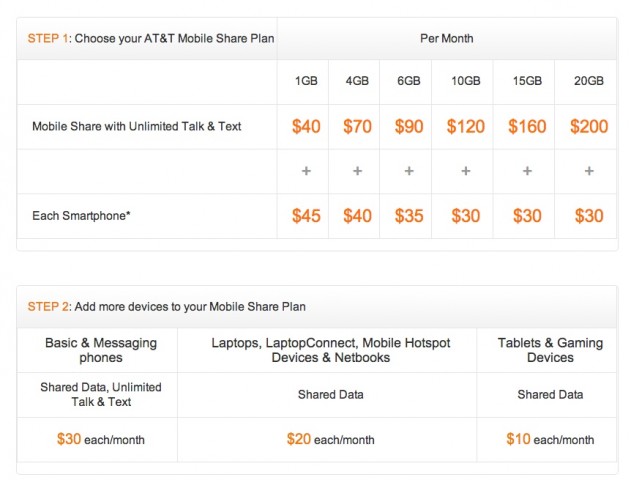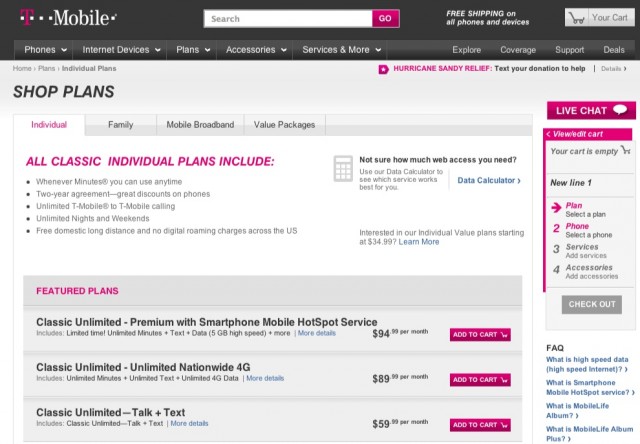Waiting in line at the DMV or getting a root canal are just a couple of things that sound more pleasant than finding a new smartphone plan.
If you’ve ever tried to make sense of all the different carrier plans, you know it can be confusing. Between the individual and shared plans and the different levels of data packages, the experience is maddening enough that you might feel resigned to stick to your current plan. But suffering through horrible service is a far worse alternative.
In this week’s column, I outline the smartphone data plans offered by AT&T, Sprint, T-Mobile and Verizon, along with some of their pros and cons. With so many factors affecting pricing — the number of individuals on a plan, devices and geographic location — it’s hard to pick a “winner,” but this guide should make the decision easier.
AT&T
AT&T offers both individual and shared data plans, and the carrier lets you choose one or the other. This is particularly good news for those grandfathered in with an unlimited data plan, since you won’t be forced to switch to a shared package and give up your unlimited data.
Individual voice plans start at $40 per month for 450 minutes of voice and unlimited mobile to mobile calls to other AT&T customers, and go up to $70 per month for unlimited voice and mobile-to-mobile calls. For texting, you can pay per message, or $20 per month for unlimited texting.
Data plans range from $20 per month for 300 megabytes of data to $50 per month for five gigabytes of data and the ability to use your smartphone as a mobile hotspot, which allows you to share an Internet connection with other devices.
In some instances, AT&T’s individual plans are more expensive than the competition. For example, it costs $120 per month for unlimited voice and text and 3GB of data, whereas Verizon charges $110 per month for unlimited voice and text, 4GB of data, plus hotspot capability. Meanwhile, Sprint trumps both with a $110 plan for unlimited everything.
But with people spending less time talking on the phone, unlimited voice for individuals may not be as important.
The story is different for families, and, in that case, AT&T’s Mobile Share plans might be more economical. They offer unlimited voice and text, and let you share a bucket of data, ranging from 1GB to 20GB, among up to 10 devices on one account, instead of paying for multiple individual plans.
Mobile Share plans start at $40 for 1GB of data, and a fee is applied to each device on the plan. Just be aware that if you go over your monthly data allotment on either plan, you will be charged overage fees.
Sprint
Sprint trails AT&T and Verizon in customers, but offers competitively priced smartphone plans with unlimited data.
Individual plans start at $80 per month for 450 anytime voice minutes, unlimited voice calls to any mobile regardless of network, unlimited messaging and unlimited data, and top out with a $110 monthly plan for unlimited voice, text and data.
Sprint also offers similar plans for families. The Everything Data Family plan starts at $150 per month for 1,500 anytime minutes for one to two lines, while the Simply Everything Family plan costs $210 per month for unlimited everything for one or two lines.
Sprint does not slow down data speeds — a practice known as “throttling” — once you reach a certain data limit, so you’re getting true unlimited data.
As such, Sprint offers a lot of bang for your buck, but its 4G LTE coverage area is significantly smaller than what AT&T and Verizon offer. Sprint’s LTE service is currently available in only 32 markets, but will be rolling out to 100 more cities in the coming months. By comparison, Verizon’s LTE network is the biggest, available in 410 markets, while AT&T has launched LTE in 80 markets.
T-Mobile
Of the four carriers, T-Mobile has the cheapest data plans, but also the most confusing.
Individuals and families can choose either a Classic or Value plan. Classic plans with unlimited voice (including T-Mobile to T-Mobile calls), text and data, start at $80 per month, but the carrier also starts to throttle speeds once you reach 2GB. If you choose the $95 or $125 Classic Unlimited bundles, T-Mobile will begin throttling after you hit 5GB and 10GB, respectively, and adds mobile hotspot capability.
Meanwhile, Value plans allow you to bring your own phone to the network, or buy a handset at full price in exchange for a lower monthly rate. For example, the Unlimited Plus Value plan, which includes unlimited text, voice and data (throttling begins at 2GB), costs $20 less than the Classic plan.
The same plans are available for families, with pricing starting at $140 per month for the Classic Unlimited Plus Family plans, and $100 per month for the Unlimited Plus Value plan.
But wait, there’s more.
T-Mobile recently introduced an Unlimited Nationwide 4G Data plan. It costs $90 per month under the Classic plan and gives you true unlimited data without throttling or overage fees. The price is $70 per month when subscribing under the Value plan. The only catch is that you can’t add mobile hotspot capability to this plan at all.
One other thing to note about T-Mobile is that it doesn’t have a 4G LTE network yet. The carrier may advertise its “4G” speed on TV, but technically it’s an enhanced 3G network.
Verizon
Verizon did away with its unlimited data plans earlier this summer and switched to a tiered data plan called Share Everything. Now it’s the only option available for new and existing customers. Those who previously had unlimited data plans can keep them, as long as they keep their old device or pay full retail price for a new handset, which is not cheap.
Share Everything pricing is based on the number and types of devices, and the amount of data you want per month. Monthly fees range from $40 for a smartphone to $10 for a tablet, and shared data options start at $50 per month for 1GB of data and go up to 20GB for $150 per month. All include unlimited talk and text and mobile hotspot capability. But Verizon also charges overage fees.
I did a cost comparison of AT&T and Verizon’s shared data plans, and pricing is similar. For families of more than two, AT&T is slightly cheaper at the 6GB and 10GB plan level, but Verizon is more affordable at the 20GB level.
My advice: Take the time to calculate the costs yourself. Use tools on carriers’ Web sites to determine how much data you will need, and ask friends and neighbors about their experiences with carriers in your area.
Updated on Nov. 2 with clarifications to the T-Mobile Unlimited Data plans.

















